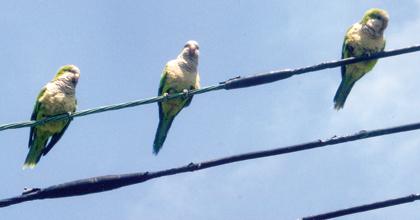By Stephen Stirling
City Councilman Tony Avella (D−Bayside) said last week he plans on pushing the state Legislature to have a group of South American Quaker parrots, which have found a comfortable home atop Queens’ trees, protected by the state.
Wild Quaker, or monk, parrots are small, colorful birds native to Argentina and Brazil. For several decades, however, they have found a home in Queens and Brooklyn, building massive nests on top of telephone poles and trees. In Queens, they are a common site in Whitestone in particular, often lining telephone wires in the quiet neighborhood.
“Although they are not native to our area, Quaker parrots have made a home throughout many communities in New York City over the past 40 years,” Avella said. “Many bird enthusiasts and community residents have grown extremely fond of the parrots and want to ensure their safety. Whenever possible, the city should relocate these beloved wild bird nests rather than simply displace them.”
How they came to call Queens home is unclear, but it is believed by many bird enthusiasts that sometime in the 1960s, a shipment of the birds was released into the wild following their arrival at John F. Kennedy International Airport in southeast Queens.
Avella said he is drafting a Council resolution that would call on state legislators to amend the New York State Environmental Conservation Law to add Quaker parrots to the list of protected birds in the state.
“Adding these birds to the protected species class would also prevent the current poaching and netting of these birds for commercial profit,” added Avella.
One city agency, the city Department of Design and Construction, through the efforts of employees and other volunteers, has already taken steps to relocate a group of more than 40 Quaker Parrots from a nest they had formed on top of light towers surrounding the Throgs Neck Little League baseball complex in the summer of 2007.
The relocation and protection of several different kinds of birds that make their nests atop city− and state−owned structures is a common practice in the city.
Reach reporter Stephen Stirling by e−mail at sstirling@timesledger.com or by phone at 718−229−0300, Ext. 138.



































